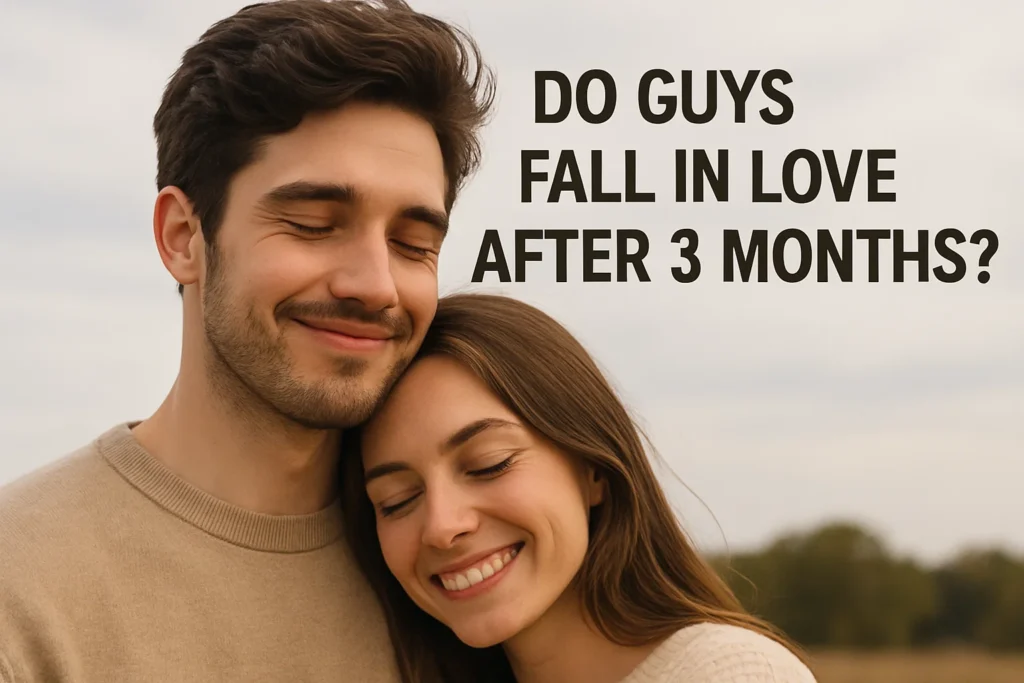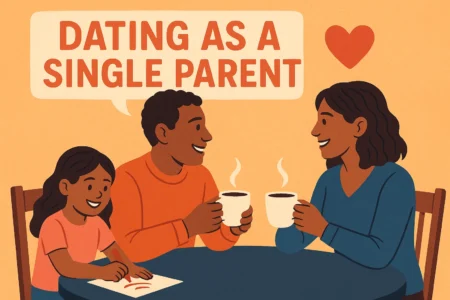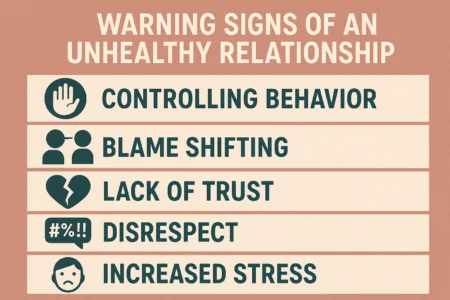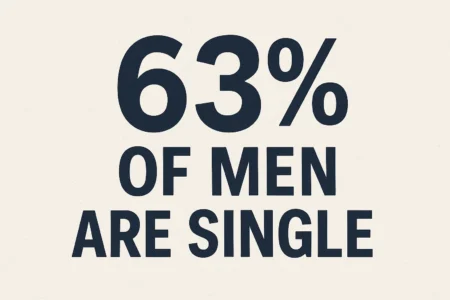I still remember the 90-day countdown with my ex, James. Those first two months? A total dream. We had amazing dates, 2 a.m. phone calls, and that buzzing, electric feeling of “this is finally it.” Then, right around week eleven, everything changed. The “good morning” texts trickled to a stop. All the “we” talk about the future just… vanished. I was left staring at my phone, completely lost, asking myself what I did wrong. It’s the invisible checkpoint we all seem to dread: the three-month mark. It feels less like a milestone and more like a final exam. And it’s the reason for that frantic, middle-of-the-night Google search: Do guys fall in love after 3 months?
It’s a question that can make you feel a little crazy. You’re just looking for a sign, a map, some confirmation that what you’re feeling isn’t a one-way street. We’re fed this idea that 90 days is when things either get serious or they implode. But is that real? Is love some kind of program with a 12-week deadline? As someone who’s written about this stuff for years—and lived through my own 90-day blowups and slow-burn successes—I can tell you the answer is a complicated, messy, and wonderfully human “it depends.” So let’s grab a coffee and really get into it.
Key Takeaways
- Love Isn’t on a Schedule: There is no magic timeline. The “three-month mark” is more of a cultural myth (thanks, rom-coms) than a hard-and-fast biological rule.
- Lust vs. Limerence vs. Love: What you feel in the first three months is usually intense attraction (lust) or obsessive infatuation (limerence). That’s not the same as the deep, steady commitment of real love.
- The Honeymoon Hangover: Three months is, however, often when the “honeymoon phase” chemicals start to wear off. This is when you’re forced to see if there’s a real connection under all that initial excitement.
- Watch His Actions, Not the Calendar: A man’s consistency, his willingness to be vulnerable, and his genuine effort to make you part of his life are the real indicators. Those are far more reliable than a date on the calendar.
- He’s His Own Person: His past baggage, his emotional availability (or lack thereof), his age, and even how often you see each other will dramatically change his personal timeline.
- Anxiety Is the Real Vibe-Killer: Obsessing over a deadline creates a nervous energy that can actually push a partner away. The best thing you can do is focus on building a real connection, not on clock-watching.
So, What’s This 90-Day Obsession Really About?
Why do we all collectively hold our breath at 90 days? It sounds so random, but we all feel it. This timeline seems to be a mashup of pop culture—think of every movie where the couple is living together by the time the credits roll—and a dose of psychological truth. For a lot of people, three months is the average length of that giddy, butterflies-in-your-stomach “honeymoon phase.”
This is the part where everything is shiny and new. You’re both high on a cocktail of dopamine and attraction. You’re on your best behavior, and the chemistry feels like it could power a small city.
Here’s the catch: that intense, can’t-eat-can’t-sleep energy can’t last forever. It’s just not sustainable.
Right around that three-month mark, those powerful “chase” chemicals start to settle down. Reality filters in. You see him when he’s grumpy. He sees you when you’re stressed about a work deadline. This isn’t a bad thing. In fact, it’s the most important test of a new relationship. This is the moment where simple infatuation gets the chance to grow into something real. The 90-day mark isn’t a finish line for falling in love; it’s the starting gun for staying in love.
But Are We Talking About Lust, Infatuation, or Actual Love?
This is the most important question you have to ask yourself. When you’re wondering if he’s “falling in love,” what does that even mean? Men, just like women, feel a whole range of emotions. We just tend to stuff them all under the one big, scary umbrella of “love.”
Is It Just Physical Attraction?
Let’s be real. Lust is usually what gets the ball rolling. It’s that immediate, primal “I want you” feeling. A guy can feel this in three seconds, forget three months. It’s powerful, it’s biological, and it’s a great part of a new connection. But it isn’t love. It’s an appetizer. If the relationship is running only on this, it’s guaranteed to burn out the second the novelty fades—which often happens (you guessed it) right around that three-month mark.
Could It Be Limerence (The “Obsession” Phase)?
This. This is the one that fools us every single time. Limerence is the official term for that head-over-heels, “can’t stop thinking about them” obsession. It’s the literal “falling” part of falling in love. It’s a drug. Your brain is churning out hormones that make you feel like you’ve finally, finally, found your soulmate.
Can a guy be in a state of limerence at three months? Oh, absolutely. This is prime time for it.
The danger? Limerence isn’t based on reality. It’s an obsession with an idealized version of a person. This is exactly what happened with James. He wasn’t in love with me. He was in love with the chase, the newness, and the perfect, polished version of me he saw on our dates. The minute my real, messy, imperfect self started to show, the fantasy shattered. And he was gone.
Then What Does “Real Love” Look Like for Him?
Real, lasting love—the kind they call “companionate love”—is what’s left after the fireworks die down. It’s not a frantic “fall”; it’s a conscious “build.” It’s a choice. It’s him seeing you—flaws, bad moods, and all—and actively choosing to stay, to invest, and to build something with you.
This kind of love is about trust, commitment, and a deep, quiet affection. It’s not as loud as limerence, but it’s infinitely stronger. Does this happen by the three-month mark? Honestly, it’s rare. The seeds of it might be planted, but the tree takes time to grow. For most guys, three months is when they’re just starting to look at you and think, “Yeah, this is someone I could build that with.”
What’s Actually Going on in His Brain?
This isn’t just feelings and poetry; it’s straight-up biochemistry. When a man is first drawn to you, his brain gets a huge hit of dopamine (the pleasure chemical) and norepinephrine (which creates that alert, excited energy). This is the “chase.” It feels amazing.
But for a relationship to last, the brain has to pass the baton. As Harvard Medical School explains, the brain has to move from “attraction” to “attachment.” This new phase is run by two totally different, much calmer hormones: oxytocin (the “cuddle hormone”) and vasopressin (the “commitment hormone”).
This switch is what creates the feeling of bonding, safety, and deep connection. It’s what makes him feel protective of you. It’s what makes him see you as a partner, not just a conquest. This chemical handover is a much slower, steadier process. It builds quietly over time, with shared experiences, vulnerability, and physical closeness. The 90-day mark is often just the point where this transition is either starting to happen or failing to launch.
What Are the Clues He’s Genuinely Falling for You (Not Just Infatuated)?
Forget the calendar. Seriously. If you want to know how he really feels, you have to watch what he does. A man’s actions are almost always louder than his words, especially when it comes to deep emotions.
Here are the real-deal signs I’ve learned to look for, both in my own life and in the stories of countless others:
- His Consistency Becomes Comforting: In the beginning, excitement is a random, 1 a.m. “u up?” text. Real love is a predictable “Good morning” text. It’s him calling when he says he will. It’s a steady, reliable presence that tells you, “You’re a priority, not an option.”
- He Starts Speaking in “We”: Just listen to his language. Is he still talking about his summer plans? Or has it slowly become, “What are we going to do in July?” This little word change is a massive mental shift. It means he’s moved you from the “temporary” folder in his brain to the “permanent” one.
- He Integrates You: This is the big one. He doesn’t just fit you in to his life; he integrates you. You’re not a secret. He’s genuinely excited for you to meet his friends. He talks about you to his family. He wants the people in his world to know you, and he wants to know yours.
- He’s Genuinely Curious: A guy in lust asks questions to find the right buttons to push. A guy in love asks about your weird childhood pet, your fear of heights, or the details of your boring work meeting… and he actually remembers the answers. He’s not trying to impress you; he’s trying to know you.
- He Lets You See the “Real” Him: He’s not “on” all the time. He’ll admit he had a terrible day. He’ll share a story about a time he messed up. He’ll be vulnerable. This is a huge, huge sign of trust. He’s not just showing you his highlight reel; he’s letting you see the person behind it.
- He Becomes Your Teammate: When you’re stressed, he’s in your corner. He’ll listen to you vent, offer advice (but only if you ask), or just show up with wine. Your happiness and well-being have become part of his.
What Factors Can Change This “Love Timeline”?
If there’s one thing to take away from all this, it’s that there is no formula. Every man is different, and his timeline is being pulled and pushed by a thousand different factors.
How Much Does His Age and Experience Matter?
A ton. A guy in his early 20s is often still figuring out who he is, let alone what he wants in a partner. He might “fall in love” a dozen times, but it’s often that fast-burning, dramatic limerence. A man in his 30s or 40s? He’s got more data. He might be more cautious because he’s been burned before. Or, he might be more decisive because he knows what’s real and what isn’t, and when he finally sees it, he’s ready to lock it down.
What About His Emotional Availability?
This is, without a doubt, the single biggest factor. A man could meet his perfect woman, but if he is emotionally unavailable, it’s a non-starter. He might be getting over a bad breakup. He might be buried in stress at work. He might have deep-seated trust issues he’s never dealt with. His inability to fall in love in three months (or even three years) often has absolutely nothing to do with you and everything to do with his own internal world.
Does How Often We See Each Other Speed Things Up?
Oh, 100%. A couple who sees each other twice a week is on a completely different track than a couple who, for whatever reason, ends up spending every night together after the first month. More shared experiences, more time, and more challenges you get through together… all of that accelerates the bonding process. By contrast, a long-distance relationship might take a year to get to the same place a local couple reaches in three months.
He Hit 3 Months… and Now He’s Pulling Away. What’s Happening?
Ugh, this is the one we all dread. It’s the classic “James” scenario. This pullback is the number one sign of the infatuation fade. The dopamine high is over, and the very real, not-always-exciting reality of a relationship is setting in. This is the moment of truth.
He’s at a crossroads. He’s realizing you’re a real, complex human—not the perfect, 2D fantasy he was obsessed with. He’s either going to be scared off by this… or he’s going to be intrigued, lean in, and realize that the real you is even better. His withdrawal isn’t always a “no.” Sometimes, it’s just a “whoa, this is real” moment. He’s processing. The only question is whether he processes and steps forward or processes and steps back.
The Counter-Story: My Husband, the “Slow Burn”
Now, let me tell you about my husband, Ben. Three months into dating Ben, I was not in love. And he wasn’t in love with me. I liked him. A whole lot. He was kind, he was funny, and he was incredibly consistent. But that electric, “James” feeling? The one that makes you sick to your stomach? It wasn’t there.
At our 90-day mark, we were just… comfortable. We were having fun. We were learning about each other. There was no big “I love you” moment. I remember a friend asking me if I thought he was “The One,” and I just shrugged and said, “I don’t know, but I’m really happy, and I’m excited to see him tomorrow.”
The “in love” feeling snuck up on both of us. It wasn’t a fall; it was a slow dawning. It happened for me around the six-month mark. It was a random Tuesday. He was telling me a really dumb story about his boss, and I just looked at him and thought, “Oh. I love this man. I really, truly love him.” He told me a few weeks after that. His “fall” was just as slow and steady. It was built on a foundation of inside jokes, mutual respect, and getting each other through a few minor life crises. It didn’t have the fireworks. It had the deep, warm glow of a fireplace. It was real.
So, Should I Be Worried If He Hasn’t Said “I Love You” by 3 Months?
No. Please, please do not be worried. The pressure to say those three words is intense, and a lot of guys feel it. He might be feeling it for a while before he’s ready to say it. He might be waiting to make sure you feel it. He might be one of those people who believes those words are dead-serious, and he wants to be 100% certain before he lets them out.
This is where you have to, once again, look at the evidence.
Actions That Say ‘I Love You’ Louder Than Words:
- He answers the phone when you call, even if he’s busy.
- He remembers you hate pickles and makes sure the waiter leaves them off your burger.
- He brags about your work promotion to his friends.
- He’s your biggest cheerleader and your softest place to land.
- He shows up. When your car breaks down, when you’re sick, when you’re just sad… he’s there. No questions asked.
A man who does these things is, in his own way, telling you he loves you every single day. The words will come. But the actions are what you can build a life on.
What If I’m Freaking Out About the Timeline?
Stop. Take a deep breath.
I get it. It’s so hard not to get in your own head. But the anxiety you’re feeling is the real enemy here, not the calendar. When you’re constantly monitoring the relationship’s “progress,” you’re not in the relationship. You’re not present. You’re accidentally sending out waves of anxiety instead of affection, and men can feel that a mile away. It can make them pull back, which makes you more anxious, and… you see the cycle. It’s a self-fulfilling prophecy.
A watched pot never boils.
And an anxiously-timed relationship never gets the space to just relax and bloom naturally. Stop counting the days. Start making the days count. Are you having fun? Is he a good person? Does he treat you well? Do you like who you are when you’re with him? Those are the only questions that matter.
Is There a “Right” Timeline? My Final Take
Some do. Some fall into a temporary, crazy infatuation. Some are just starting to feel the first, deep, quiet stirrings of real attachment. Some are nowhere near it. And all of that is perfectly okay.
My story with James taught me that a fast “fall” is often just a quick trip into obsession. My story with my husband taught me that real, lasting love doesn’t need to rush. It builds. It takes its time, and it’s so much stronger for it.
The three-month mark is not a deadline. It’s not a test. It’s simply the end of the introduction. It’s the point where the story has the choice to get really good. Stop flipping ahead to see how it ends. Live the chapter you’re in. The best love stories, I’ve found, aren’t the ones that follow a script. They’re the ones you write yourselves, one un-timed, authentic day at a time.
FAQ – Do guys fall in love after 3 months
What are the main stages a man goes through in falling in love?
Initially, a man experiences attraction and limerence characterized by hormonal highs, but lasting love involves a transition to attachment marked by trust, vulnerability, and commitment, which develops over time.
How can I tell if he’s genuinely falling for me and not just infatuated?
You can tell he’s genuinely falling if his actions become consistent and reliable, he includes you in his life genuinely, shows curiosity about you beyond superficial questions, and is willing to be vulnerable.
What factors influence the speed of falling in love?
Factors include his age and life experience, emotional availability, how often you see each other, and shared experiences, all of which can accelerate or slow down the relationship’s development.
What should I do if he starts pulling away at the 3-month mark?
If he pulls away, it could indicate the infatuation phase ending or a moment of processing real relationship dynamics. Focus on building patience and understanding, and communicate openly to see if there’s a mutual desire to continue.





